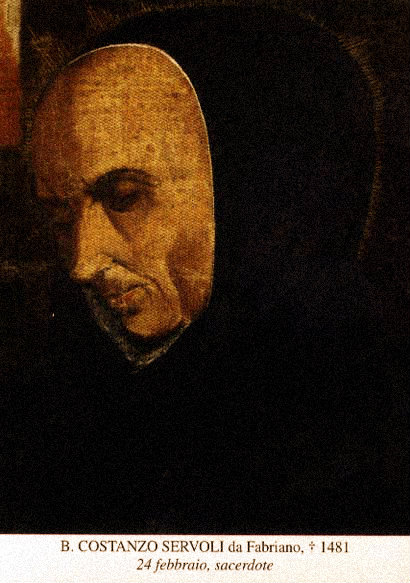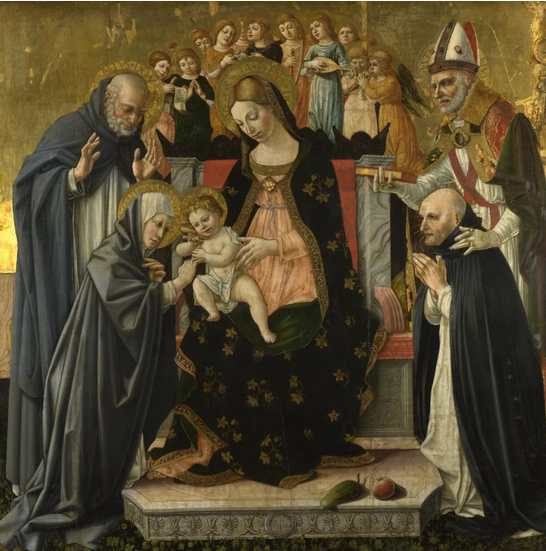dominican saints
Bl. Constantius of Fabriano, C.O.P.
Feast Day February 25th

Born: Born in the early part of the 15th century in Fabriano, Marches of Ancona, Italy
Died: 1481 of natural causes; the local senate and council
assembled at the news of his death, proclaimed it a “public calamity”, and voted to pay for the funeral.
Beatified: 1821 (cultus confirmed) by Pope Pius VII
Constantius Bernocchi is as close to a ‘sad saint’ as it’s possible for a Dominican to get; he is said to have had the gift of tears. However, that is not his only claim to fame. Constantius had an remarkable childhood, not only for the usual signs of precocious piety, but also for a miracle that he worked when he was a little boy. Constantius had a sister who had been bedridden most of her nine years of life. One day, the little boy brought his parents in to her bedside and made them pray with him. The little girl rose up, cured, and she remained well for a long and happy life. Naturally, the parents were amazed, and they were quite sure it had not been their prayers that effected the cure, but those of their little son.
Constantius entered the Dominicans at age 15, and had as his masters Blessed Conradin and Saint Antoninus. He did well in his studies and wrote a commentary on Aristotle. His special forte was Scripture, and he studied it avidly. After his ordination, he was sent to teach in various schools in Italy, arriving eventually at the convent of San Marco in Florence, which had been erected as a house of strict observance. Constantius was eventually appointed prior of this friary that was a leading light in the reform movement. This was a work dear to his heart, and he himself became closely identified with the movement.
Several miracles and prophecies are related about Constantius during his stay in Florence. He one day told a student not to go swimming, because he would surely drown if he did. The student, of course, dismissed the warning and drowned. One day, Constantius came upon a man lying in the middle of the road. The man had been thrown by his horse and was badly injured; he had a broken leg and a broken arm. All he asked was to be taken to some place where care could be given him, but Constantius did better than that–he cured the man and left him, healed and astonished.
Constantius was made prior of Perugia, where he lived a strictly penitential life. Perhaps the things that he saw in visions were responsible for his perpetual sadness, for he foresaw many of the terrible things that would befall Italy in the next few years. He predicted the sack of Fabriano, which occurred in 1517. At the death of Saint Antoninus, he saw the saint going up to heaven, a vision which was recounted in the canonization process.
Blessed Constantius is said to have recited the Office of the Dead every day, and often the whole 150 Psalms, which he knew by heart, and used for examples on every occasion. He also said that he had never been refused any favor for which he had recited the whole psalter. He wrote a number of books; these, for the most part, were sermon material, and some were the lives of the blesseds of the order.
On the day of Constantius’s death, little children of the town ran through the streets crying out, “The holy prior is dead! The holy prior is dead!” On hearing of his death, the city council met and stated that it was a public calamity.
The relics of Blessed Constantius have suffered from war and invasion. After the Dominicans were driven from the convent where he was buried, his tomb was all but forgotten for a long time. Then one of the fathers put the relics in the keeping of Camaldolese monks in a nearby monastery, where they still remain (Benedictines, Dorcy, Encyclopedia).


Bl. Constantius of Fabriano, Confessor
Taken from “Short Lives of the Dominican Saints” (London, Kegan Paul, Trench, and Trübner & Co., Ltd., 1901)
Blessed Constantius was born at Fabriano in Italy, A.D. 1410, and his family name was Servoli. He was remarkable as a child for his tender piety, so that the neighbors used to call him “the friend of God.” He had a sister who was nine years old, who for seven years had been suffering from an incurable malady. One day, after fervent prayer, little Constantius led his father and mother to the invalid’s bedside and made them kneel down with him. Then he prayed aloud for his sister’s recovery, and immediately she was restored to perfect health. As though to prognosticate his future vocation to the Order of Preachers, the child continually addressed fervent and forcible exhortations to all who would listen to him and succeeded in bringing some hardened sinners to repentance.
At the age of fifteen he entered the Dominican novitiate at the Convent of Saint Lucy at Fabriano, which had enjoyed the privilege of having successively as priors the Blessed John Dominici, the Blessed Laurence of Ripafratta, and Saint Antoninus, and which he was destined himself one day to govern. Here he made admirable progress in learning and sanctity, and he afterwards taught with great profit to his hearers in many of the cities of Italy.
Blessed Constantius led a life of extreme austerity and devoted much time to prayer, spending a great part of the night before the Blessed Sacrament and watering the pavement of the Church with his tears. He was accustomed daily to recite the Office of the Dead and very frequently the entire Psalter; and, in order to encourage his Brethren to practice the latter devotion, he used to tell them that he had never failed to obtain from God whatever he had asked of Him by its means. When the Turks attacked Constantinople, A.D. 1453, the Friars begged Blessed Constantius to say the Psalter in order to obtain their defeat; but, though he began it several times, he was always prevented from finishing it; whence he concluded that it was the will of God that, in punishment for the sins of Christendom, the Mohammedans should be victorious.
Blessed Constantius held the office of Prior successively in the Convents of Perugia and of Ascoli. It was during his period of government of the last-named Convent that, on the morning of the Feast of the Ascension, 1459, he beheld in vision the soul of Saint Antoninus being borne, marvelously beautiful, to heaven. In the Bull of Canonization of the great Archbishop of Florence, Pope Clement VII mentions this vision and speaks of Blessed Constantius, with whom he had been personally acquainted whilst Governor of Fabriano, as “a man no less illustrious for his sanctity of life than for his learning.”
This holy man possessed the gift of prophecy, and his miracles were very numerous. On one occasion he raised to life a young man who had been dead two days. The relatives of the deceased and the other bystanders reviled him, accusing him of tempting God when they heard him address the corpse with the words, “In the name of Jesus Christ, arise;” but when they saw the dead man rise, they threw themselves in terror at Blessed Constantius’s feet. He gently raised them from the ground, saying, “Never despise the servants of God and remember Our Lord’s promise: ‘He that believeth in Me, the works that I do he also shall do, and greater than these shall he do.’”
The countenance of Blessed Constantius habitually wore that look of gentle sadness which is said to have been the characteristic of all the disciples of Saint Catharine of Siena and of those whom they trained to the religious life, and which is sufficiently accounted for by the wickedness of the times in which their lot was cast. In the case of Blessed Constantius, however, it seems also to have had its source in an interior trial permitted by God for his sanctification; for, being once asked why he never looked perfectly happy, he replied, “Alas! I know not whether my actions are pleasing to God or not.”
The Convent of Ascoli was the last to enjoy the blessing of being governed by this faithful servant of God, and there he died on February 24, 1481. Scarcely had he expired when a crowd of little children ran through the streets exclaiming, “The holy Prior is dead!” He was beatified by Pius VII, in 1811.
Prayer
O God, who didst make the Blessed Constantius, Thy Confessor, glorious amongst the people for his continual exercise of prayer and his zeal in the pro motion of peace, grant, by his intercession, that, walking always in the paths of justice, we may attain to everlasting peace and glory. Through Christ our Lord. Amen.
Prayers/Commemorations
First Vespers:
Ant. Strengthen by holy intercession, O Constantius, confessor of the Lord, those here present, have we who are burdened with the weight of our offenses may be relieved by the glory of thy blessedness, and may by thy guidance attain eternal rewards.
V. Pray for us, Blessed Constantius.
R. That we may be made worthy of the promises of Christ.
Lauds:
Ant. Well done, good and faithful servant, because Thou hast been faithful in a few things, I will set thee over many, sayeth the Lord.
V. The just man shall blossom like the lily.
R. And shall flourish forever before the Lord.
Second Vespers:
Ant. I will liken him unto a wise man, who built his house upon a rock..
V. Pray for us, Blessed Constantius.
R. That we may be made worthy of the promises of Christ.
Prayer:
Let us Pray: O God, who didst enable Blessed Andrew, Thy Confessor, to preach the gospel of peace by word and deed, make us, we beseech Thee through his intercession, to receive Thy law with a perfect heart and fulfill it by holy deeds. Through Christ our Lord. Amen.